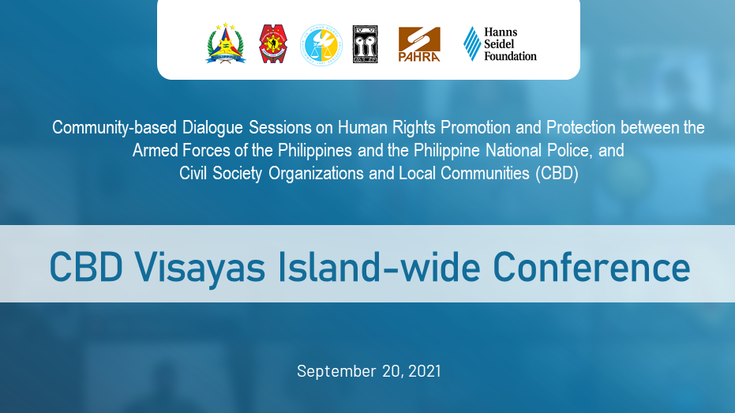Community-based Dialogues (CBD)
CBD holds Visayas Island-wide Conference
CBD Visayas Island-wide Conference
HSF
The activity was well attended with more than 80 participants from all over the Visayas and from NCR representing the partner institutions (CHR, PNP, AFP, ALG, PAHRA, CSOs, HSF).
CHR focal person for the CBD project, Commissioner Karen Gomez-Dumpit noted the importance of strengthening capacities and the CBD mechanism to ensure that the goal of the project will be met, i.e., open communication lines, frank and open dialogue but, at the same time, to make sure that it is a safe space for everyone. In addition, she mentioned that the CBD has been utilized for civil society and security sector to discuss in a non-confrontational and non-adversarial manner different issues concerning human rights (civil, political, economic, social, cultural) in the localities. She underscored the focus of the current phase (5th) which is localization and institutionalization of the CBD to assess how well the CBD mechanism is made a part of our goal to promote and protect human rights. She welcomed recent developments such as adoption of resolutions at the Regional Development Council (RDC) and at the LGU level in support of the CBD. She hoped a better relationship with the security sector by restoring trust and confidence especially among civil society with CHR serving as bridge that leads civil society to government and vice-versa.
Notwithstanding the limitations brought by the global health pandemic since 2020, representatives of the CBD core group from the Visayas regions articulated in their presentations remarkable results of the CBDs they have conducted so far. In terms of achievements, strengths and best practices, they attributed the positive impact of the CBDs in their respective regions to the regular conduct of CBDs in an open, respectful and constructive approach; participation of citizenry/various sectors (inclusive); direct communication; passage of relevant policies/ordinances/issuances/resolutions borne out of closer collaboration with government agencies and local government units (e.g., MOU between CHR and AFP in upholding human rights; San Jose, Antique MPOC resolution, conduct of training); and sharing of available resources through strengthening partnerships [full support of national/regional offices of partner organizations (CHR, AFP, PNP) via data sharing and conduct of investigation for possible access to remedies, the academe and justice sector (education/training/research)]. Despite the need to hold online activities, it was noted that the CBDs are effective as it brings together concerned sectors to discuss and find solutions to common problems experienced in the community as well as facilitates better understanding between and among sectors (non-confrontational/safe space) in light of an enhanced relationship. They also found it to be a good platform to disseminate information and advocacy on various efforts to help the community in response to difficulties the latter are facing (e.g., PNP hotline numbers, institutionalization of courses with strong HR dimension/perspective together with the academe).
As to challenges and gaps, the following were mentioned: low internet connectivity, COVID protocols, discrimination/red-tagging, participants have limited know-how on technology, reassignment/tenure of security forces, case build-up, negative perception on members of security sector and academe by some communities, weak referral system, difficulty in maintaining coordination with partner CSOs, security risk/geographical location, uncooperative victims/witnesses, data privacy issues, funding constraints, and sustainability of CBD.
With respect to lessons learned and recommendations, they stressed the following: continue/ strengthen the CBDs and existing partnerships; regular core group meetings; consistent and continuous human rights education; create uniform referral/feedback mechanism system (communication hubs, e.g., Viber); encourage active participation of government agencies in the CBD; regular mapping of stakeholders; develop parameters of CHR’s ‘motu propio’ investigation; among others.
During the open forum, PNP Human Rights Affairs Office (PNP-HRAO) chief, Police Brig. Gen Vincent Calanoga opined that during CBDs, it is important to ensure the presence of government agencies especially LGUs for them to take note and address the concerns raised by their constituents. He acknowledged that the CBD was instrumental to better understand each other and work together especially with government despite its limitations. He assured the group that the PNP is continuously conducting capability-building activities from the national to municipal/city police stations to prevent and/or address human rights violations of its personnel on the ground. He thanked the regional HRAOs for conducting CBDs and seminars in cooperation with the partners – CHR & CSOs; likewise he expressed his appreciation to the CHR and CSOs for working with the PNP towards a peaceful community and development-oriented citizenry.
The Director of CHR-PAO, Atty. Gemma Parojinog, and HSF Resident Representative, Mr. Goetz Heinicke, gave their respective closing remarks. Atty. Parojinog thanked the PSC members and officers of the CHR regional offices present. She acknowledged the testimonies of the presentors expressing the effectiveness of the CBD in addressing human rights issues and the need to continue/strengthen the CBDs to make it more efficient in delivering desired results. She noted that communication is key – open, transparent, candid – towards sustaining the CBD between the security sector and CSOs with CHR as “bridge” between them in resolving challenges and gaps through the implementation of CBD.
Mr. G. Heinicke congratulated the group for the fruitful conduct of the dialogue and was encouraged by the positive reports of the partners on the conduct/outcome of the CBDs in the Visayas island and the call to continue/strengthen its implementation at the local level in cooperation with the partner institutions and relevant stakeholders. He expressed continued support to the project in the future.

